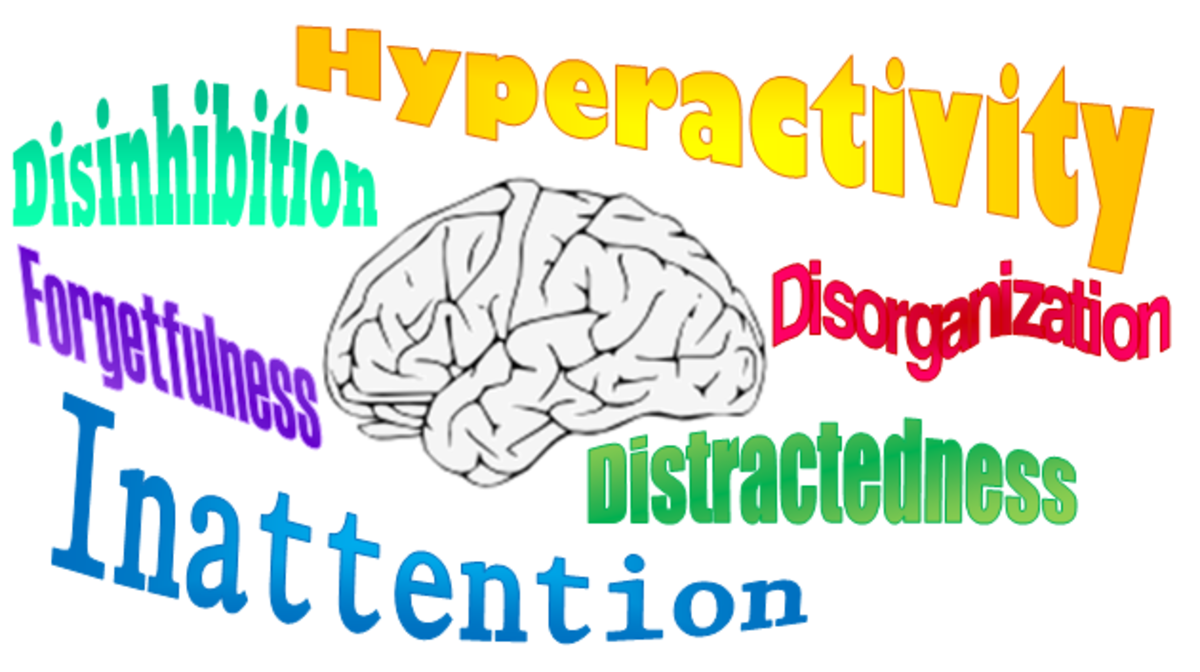Attention Deficit Disorder: Diagnosing ADD in Women and Girls

Do you or your child have ADHD/ADD?
ADD/ADHD in Girls
Attention Deficit Disorder (with or without) hyperactivity, can be difficult to diagnosis in young girls. It is common for it to go unnoticed in the classroom by the teachers and thus is under-reported. Below is a list of behaviors that either separately or combined, can be a signal that ADD/ADHD may need to be identified.
- There is evidence that the girl is daydreaming quite frequently in the middle of class.
- Girls with ADHD/ADD may stare out the classroom window and twirl their hair over and over.
- While boys with ADHD will be more active and not in their seat while in the classroom, girls will be sitting in their seat and be picking at their cuticles on their nails.
- Girls would feel anxious and depressed but not to the levels that would have been identified and diagnosed by meeting the criteria.
- Young girls will talk a lot and fast and about all sorts of topics.
- Girls will appear to be "showing off" and/or appear to be "boy crazy"
- On the opposite side they also may not be noticeable, as if they always "fade into the background". They will be shy and not pay attention.
- Many girls will seem to have a difficult time staying friends with another girl for any length of time.
- When they notice they can't focus they may go the opposite way when they try to regain some control over their focus and become what is called "hyper-focused".
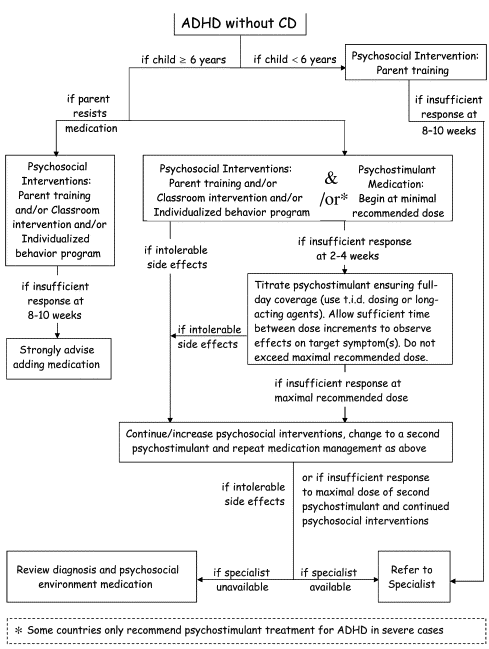
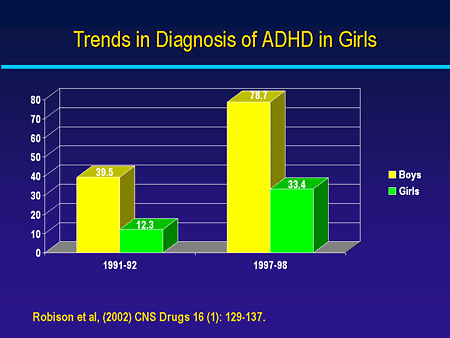
Why is it Important for an Early and Accurate Diagnosis of ADD/ADHD?
Women and girls are commonly diagnosed at a rate less than the males. They also require different treatment that is specific to their gender. Girls are diagnosed at a ration of 1 to 3 boys. In the 1990s that was 1 to 8. However the diagnosis of an adult women to an adult male is one to one.
Psychologist, Stephen Hinshaw, Ph.D, headed a longitudinal study of girls with ADD/ADHD with psychologist Russell A. Barkley, Ph.D, and states that the ration of 1 in 3 is probably the most accurate.
"Boys seem to be more vulnerable to psychopathology" says Hinshaw.
To illustrate his point he refers to the diagnosis rates of boys versus girls for Autism.
Boys are more likely than girls to demonstrate the hyperactivity and lack of impulse control. So while boys are being diagnosed with ADHD, the girls when diagnosed will most likely be diagnosed with ADD, because of the more 'dreamlike" qualities of their symptoms.
There were several longitudinal studies done that showed a trend of the symptoms based around their activity fade during their teen years while the organizational difficulties and lack of attention persist until adulthood. Their is a theory that the reason why the ratio changes in adulthood is because women are more honest about their organizational problems and the inability to concentrate, than their male counterparts.
When girls go undiagnosed their earlier years, frustration they feel is turned inward and affects their confidence and can cause psychological damage.
Putting Girls At Risk
Hinshaw and his colleagues used one summer to examine results of ten year follow up interviews of 140 females. When the study was done the girls ranged from age 7 to age 12. The data collected showed that the girls with the ADD/ADHD are at a significantly increased risk of have low academic achievement, abusing drugs and alcohol, and even included suicide attempts.
A study published last fall in the Archives of General Psychiatry found that girls with ADD/ADHD were at far higher risk than other girls, or than boys with the disorder, for depression and suicide attempts. Another report, published last spring in the American Journal of Psychiatry, revealed that girls with ADD/ADHD were more likely than others to engage in antisocial and addictive behavior, and to suffer from anxiety.
Unlike boys, girls have a higher risk of developing depression, as well as engaging in self-injurious behavior. They also develop eating disorders.
“In other words, girls with ADD/ADHD appear to show a wider range of difficult outcomes than do boys,” Henshaw states.
The reason he claims that girls are victimized in these fashions is due to the socialization aspect. Gender role expectation plays a role as well when girls learn by kindergarten that they aren't to make trouble of any kind. Instead of making a mistake and letting teacher know they need help girls tend to lie about the mistakes and miscalculate items.
After the research and analyzing the data it seems that it is accurate to say that boys are diagnosed on average at a younger age than girls.
What is interesting is that even though its accepted that the boys experience a symptom of hyperactivity, when the girls actually do it comes under the most scrutiny and judgement. This leads to them being stigmatized. Being distracted and impulsive is viewed upon as boyish type of behavior when a group of females were wondering to make of it. He explains it as boys seem to get a "pass" for their behavior while girls are ostracized for it.
As it gets harder for a female into adulthood, society starts to except a lot out of a grown adult women. Especially when the become a mother. As a mom you are expected to have this expansive memory and now not just your own schoolwork and one room have to be organized but you have a whole household. It becomes difficult to keep track of things that are important. Many wives and mothers, if they go without any form of treatment "can't cut it".
Testimony to Ritalin
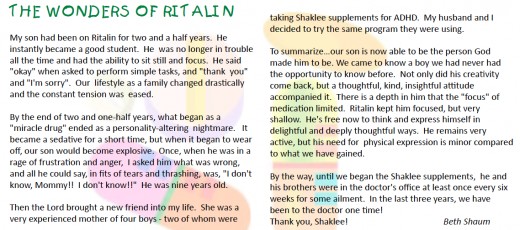
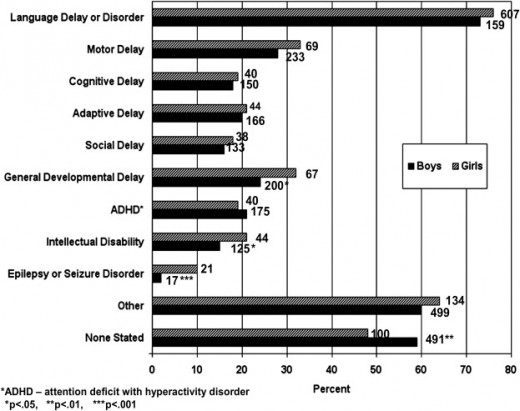
ADDitude


Treatment Options for ADHD/ADD
- Why Ritalin is Wrong (Or... IS Ritalin Wrong?) | Psychology Today
Wait a minute....People with ADD/ADHD may really need psychopharm treatment By Lynn E. O’Connor, Ph.D.... - Natural Alternative ADHD Treatment: Nutrition, Food, Meals and Diet to Manage ADHD Symptoms | Attent
Changing your child's diet can be an effective alternative ADHD treatment -- choosing the right foods can improve symptoms. ADHD symptoms, diagnosis, and treatment information for adults and children from experts in attention deficit and learning dis - ADHD Medication: Quillivant XR, a New Med for Attention Deficit
''I just heard about a liquid version of long-acting methylphenidate. Can you tell me anything about Quillivant XR?'' Expert advice on stimulant drugs to treat attention deficit, like Ritalin and Concerta. ADHD symptoms, diagnosis, and treatment info
Difference in Treatment Among Women and Girls versus Males
There are different symptoms (as we stated already) and also different treatment option between the genders.
There is a widespread opinion in the medical community that stimulant medication can benefit both genders with this disorder. Girls more often will experience anxiety as well and need additional treatment for that as well. Females, adult and children alike, can't normally tolerate a stimulant medication alone and will need other pharmaceutical help. Hench, however, disagrees with this line of thought. He doesn't support the extra medications necessarily, but does believe that evidenced based cognitive behavioral therapies are beneficial and prove to be effective.
Another gender-specific strategy that psychologist Nadeau suggest is group therapy, to encourage girls and adult women to use their verbal skills to offer each other support that is needed. They can develop coping strategies through this process and in turn not feel so alone and isolated.
Pediatrician Patricia Quinn, M.D and Nadeau have been trying to encourage their own peers to develop a diagnostic tool and symptoms that could help females actually understand their disorder better. The new DSM-V is soon coming out and there isn't much hope this new criteria will be included. Nadeau did develop a checklist, however, for women and girls alike that should be filled out by the girls themselves and NOT by parents and teachers as is traditional.
Checklist designed mostly for females:
- Anxiety and Depression-frequently wanting to cry, frequent stomaches and headaches, persistant worrying, and feeling sad while not knowing why.
- School Anxiety- dreaded feelings of being called on in class despite the fact of concentrating as well as possible because sometimes they haven't listened as well, feelings of embarrassment because of not hearing what they are supposed to do, even if the student has something to contribute they will avoid raising their hand and participating.
- Social Skills Deficit-will have trouble with other friends of the same gender and not understand or know why that is, they will complain of having frequent arguments with their friends, when wanting to join a group of girls they often don't know how or what to say, they end up with frequently feeling left out.
- Over-reacting Emotionally-frequently hurt feelings, rapidly changing feelings, more often angry and upset than other girls.
Common Medication for ADD/ADHD
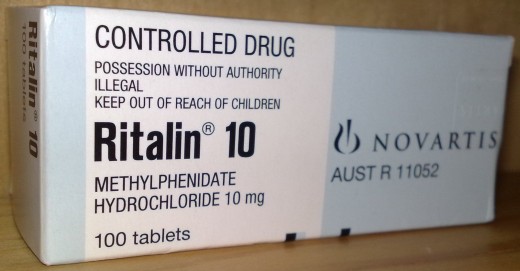
Myth: She Is Just a Little Hyper

Making Identification between ADD and OCD

8 Step Program for Strengthening Attention, Managing Emotions
Non-medication for Adults with ADHD
THE ADD/ADHD Brain
It is reported in an article in ADDitude magazine that those with ADHD or ADD have higher than average IQ scores using it in neurotypical ways. This means that by the time they are in adolescence they handle and can solve problems that others can't. They see solutions that others don't. I explain it all the time as I don't see inside the obvious box. I see everything outside the box and how it all can link to this spot down the road, the solution so to speak. I struggle with what is in the box. I need help with explanations on exactly how something works like say bankruptcy. I can see around the concept and how if I were to file it how down the road it all is affected to bring about what my desired outcome is but I can't see how it will affect little short term and right in front of me ways. I can't grasp the entire concept, or how it works, or why it will do this or that but I can see how it will do what I need at the end. I can see a shot on a pool table and the pocket. I can see right away to get it there shoot here...but I can't analyze the shot. I can't see the angles and what other options I have to make the shot. I actually flip the image to do something else if I try. People come to me when their way doesn't work and are shocked at how I see it right away and its always nothing they thought of. I have a slighter above average IQ as well.
Another interesting fact is that adults aren't overtly hyperactive, but internally. I actually can be both but always internally am hyper. I go as fast as my mind goes. Its a bunch of ping pong balls that are going light speed bouncing all over the room I envision is what my brain is. Those are the millions of thoughts I have. I am overstimulated with activity and that brings out the hyperactivity. I am using my experiences because its the simplest way to connect to an audience what they found and how a person like me can explain it. So that there is a better picture as to what we go through.
There is a misconception that we have no attention. Problem is we pay too much attention to everything. My friends hate that I talk and talk and talk. And they feel that I don't listen or see what is going on around me. Problem is I see and hear everything. It processes and later I may bring attention to it and am able to go ask about what they were saying. Leaving a bar one night my friend asked why I responded to a guy that turned out to be a PI. The PI responded to my question why doesn't he smile. He fought it. His eyes were blank and unreadable and if he smiled people can see past them and get an idea what he is about. He asked me "Who are you?" I laughed said a psychology major and ADHD. I said who are you? He told me and I nodded. I left with him smirking staring after me. I explained to my friend that thought I was talking the whole time, looking at someone else, and not engaging with the guy...I saw his body motions, his facial expressions, what he said, what he didn't say, noticed when everyone was laughing he was having a hard time keeping a straight face. I knew what they all were talking about around me, I knew what drinks they had ordered and who won what pool game. My friend was astonished. Said, "Wow, you do pay attention." I said I notice everything. My brain records it and eventually it comes all together later. Sometimes way later.
People with ADHD have four or five things going on in their brain at once. For instance, right now I am writing this, thinking about the friend I am seeing in a few, the texts from an ex I just dealt with, listening to music and randomly picking which ones to download and what I have to accomplish tomorrow for my move. I can effectively do all at once. We aren't "attention deficit" as the article states but have "inconsistent attention."
As described in the article we get into a "zone" several times a day and in that zone we don't have any problems or inconsistencies or issues. We all know we are bright, intelligent, have many talents, and never know when those will be effective and surface as we have issues bringing them to surface sometimes. For instance, I know that I can beat anyone on any issue I have self-educated on at a debate using facts and data to support my argument. But, I don't know if I will effectively communicate on that day with extensive thoughts, a big vocabulary, and be able to explain it. Some days I will stutter, can't retrieve from my memory the information I need to recall. This has proven most difficult for me on exams. Its why if its an essay I can ace it. This is because I can just write until the information comes to the surface. I can pull out the information from parts of my brain I can't verbally or on multiple choice. They are also dead on when they stated that we get thrown into our zone in a competitive situation. We also excel in new tasks given if it attracts our attention. However, it is a short lived excitement and we will dwindle in interest. We are great procrastinators and excel better being at the deadline. Its a do or die moment for us and everything becomes accessible that we for awhile struggled with. I write amazing papers a night before but the papers I do ahead of time I just don't do as well.
I am described as neurotypical. Neurotypical individuals have three different tactics to decide what to do, how to do it, and sticking to it until its finished.
1. the concept of importance (they think they should get it done).
2. the concept of secondary importance--they are motivated by the fact that their parents, teacher, boss, or someone they respect thinks the task is important to tackle and to complete.
3. the concept of rewards for doing a task and consequences/punishments for not doing it.
The importance of a task or deadline nor a reward system works for us. We already are aware of how important it is and we like the rewards, don't like the consequences but we aren't motivated by "nagging". That's what systems like that are too us. I know that in a week I board a plane for a move across the country with my daughter. I know that in three days my landlord will be showing my apartment. I know that someone is coming to get their furniture I had borrowed. I know I have to clean the apartment. I have done nothing more than is already done. I will end up in a do or die moment. I will end up having the cleanest apartment and my things all taken care of. But not until the last minute.
ADHD stemming from a nervous system that works perfectly well by its own set of rules. Unfortunately, it does not work by any of the rules or techniques taught and encouraged in a neurotypical world. That's why:
ADDers do not fit in the standard school system, which is built on repeating what someone else thinks is important and relevant.
ADDers do not flourish in the standard job that pays people to work on what someone else (namely, the boss) thinks is important.
ADDers are disorganized, because just about every organizational system out there is built on two things — prioritization and time management — that ADDers do not do well.
ADDers have a hard time choosing between alternatives, because everything has the same lack of importance. To them, all of the alternatives look the same.
People with an ADHD nervous system know that, if they get engaged with a task, they can do it. Far from being damaged goods, people with an ADHD nervous system are bright and clever. The main problem is that they were given a neurotypical owner's manual at birth. It works for everyone else, not for them.
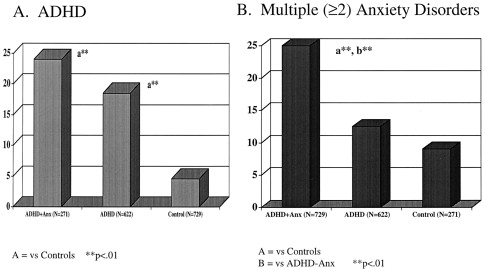
DSM5 Diagnostic Criteria
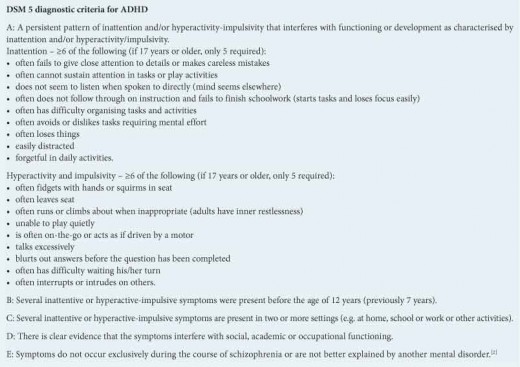
Approaches for ADHD
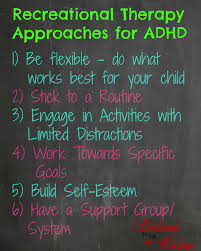
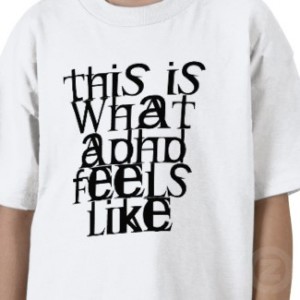
What medication was perscribed to treat you or your child's ADHD/ADD?
The LCP Solution
Scholarly Articles and Journals
- Long-Term Stimulant Medication Treatment of Attention-Defici... : Journal of Developmental & Beh
ABSTRACT. The purpose of this study was to offer detailed information about stimulant medication tre - Are Girls with ADHD at Risk for Eating Disorders? Results fr... : Journal of Developmental & Beh
Objective: To evaluate the association between attention-deficit/hyperactivity disorder (ADHD) and e - Efficacy of Atomoxetine Versus Placebo in School-Age Girls With Attention-Deficit/Hyperactivity Diso
Objective. The efficacy of atomoxetine was assessed in school-age girls with attention-deficit/hyperactivity disorder (ADHD). Atomoxetine is a potent inhibitor of the presynaptic norepinephrine transporter with minimal affinity for other noradrenergi
I have adult attention deficit disorder
I was technically diagnosed at the age of seven or eight years old with ADHD. I was a hyperactive child that talked incessantly and every time a report card came home the teacher notes would read "chatter box". I would be moved all over the room, but this didn't work as I would talk to everybody about anything. I especially liked to help when a peer needed it because it gave me an excuse to talk. If it was a time of the day we had to listen and there was no talking, I struggled and almost always would whisper. I got above average grades and was in the Gifted program through elementary and middle school but I would miss so many key aspects of what we were learning here and there that by the time those later school years came on and even in college, I missed the basics and no one knew or caught it.
My mother was told about the diagnosis and she refused to treat it as in the 1980s people believed, as she did, that the disorder either didn't exist and was just created to try and medicate difficult children so the school didn't have to exert extra energy or they were over diagnosing it. My mother didn't even get educated on the subject to decipher what was told to her and believe that because I got good grades there wasn't an issue. If I did struggle and brought home a bad grade or couldn't finish something or forgot something was do, she always would accuse me of being lazy.
I chewed on the ends of my hair so much it was always really stiff, I bit my nails and I peeled back my cuticles. I can't tell you everything I lost and how often I lost it or how many times I was yelled at because my mother had to buy it again. It ranged from toys, assignments, homework, backpack, socks, hair ties, you name it I lost it. I never thought my room was messy but apparently even though it looked clean no one could find anything in it to save their life. I was always anxious about everything, I had social anxiety's and my mother again believed I just didn't want to cooperate but I did, I just would worry so much that I would get in trouble again, "its nothing you do Abby that gets you in trouble, its your mouth". People thought I was rude when I didn't mean to be, I talked so loud that your ears would hurt if I didn't stop, and I was accused of being manipulative because of that.
It looked like grades and music and things I was good at came naturally and maybe to some extent they did, but I worked really really hard all the time. Things would get mixed up in my head and come out my mouth backwards. I would get really bad test grades if anything had multiple choice questions in it because by the time I read the question and the answers I forgot what the question was. I would read the question and answer it wrong because I didn't process that there was a NOT in the question. I have even forgotten to put my name on the paper.
I did graduate high school with honors and I got into college and I went to four colleges before I started the one I am at now. I would not go to class, I would get bored after fifteen minutes of lecture and not understand what they were talking about because I couldn't get my mind to stop and slow down. I was great at taking notes because I could keep up with lectures but they weren't always making sense. I would get up and leave for a five minute break and never go back in class. It was always the first half of the semester I had all A's and B's and the last I was struggling to keep a B or bring it up to a C. I dropped out of all four of the first school's because I would keep dropping classes that I knew I was going to struggle with and never got my requirements finished.
I was finally diagnosed after I had three kids and was married. When my son was diagnosed with Autism and I realized just how much of a routine and schedule and organization he would need, I really freaked out. I couldn't keep track of my keys, my kids missed more doctor appointments and had to reschedule than they made the first one. I would forget to pay bills, I would forget to separate the laundry, I would forget that I had to stop and make dinner. I tried lists and that didn't work because I would do everything on my list and nothing else that was routine. To be functioning at a capacity my son could flourish I had to get medicated.
Now I over focus, I get great grades but I don't want to do things that I find unpleasant so I will sit and write five hubs instead of read the three novels I have had to read all semester. I can finally do well on exams with multiple choice but I still love to talk and nothing helps that. Because I am on a stimulant, I need to be on something for anxiety. I also find myself more irritable if someone interrupts me.
My mother and father both still think that I am not ADD.. Every boss and teacher I have ever had will vouch that I am . I didn't keep friends and still struggle with it if they are female. I am sort of ostracized to an extent in the female world unless they are enough like me they understand. My male friendships last decades and they get a kick out of me and laugh all the time. I tend to be loved by my employers as I get hyper focused and get five projects done at the same time because I am a mean multi-tasker.
I am very sensitive and over emotional and I am always embarrassed and I always have to think about what I am saying, sometimes it comes out and doesn't make any sense.
I had a mixture of both of the genders. It did affect me in the ways it stated in the information but I am overcoming it...in fact after this hub I am going to go put the thirty loads of laundry away.
- ADD Women and Girls: Late ADHD Diagnosis, Little Treatment
Too often, ADD women and girls go undiagnosed and untreated. Learn how to recognize symptoms of attention deficit and get treatment. ADHD symptoms, diagnosis, and treatment information for adults and children from experts in attention deficit and lea - ADHD Treatment in children
There’s more to ADHD treatment than medication. Learn how you can help your child. - Treating girls with ADHD | BabyCenter
Treating girls with ADHD
This content was accurate and true to the best of the author’s knowledge at the time of publication but may be out of date. The information contained in this article may not reflect current policies, laws, technology, or data.
© 2012 Abby Rourk









